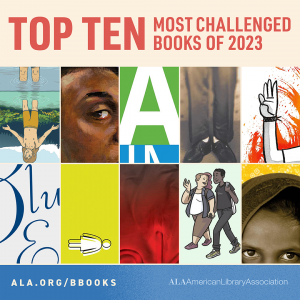If you’ve sensed that efforts to limit access to books in America’s libraries and schools are on the rise, there’s now data to prove you’re right.
Book challenges at libraries and schools rose 65% in 2023, according to the latest annual tally from the American Library Association.
Public libraries saw the biggest increase in challenges in 2023, up 92% in a year.
Overall, there were 1,247 demands to remove resources (up 11% from 2022) and 4,240 different titles targeted (up 65% from 2022’s 2,571 titles), according to ALA’s Office for Intellectual Freedom.
A separate tally of the Top 10 Most Challenged Books in the U.S. for 2023 was released Monday. The list includes numerous LGBTQ titles and books with sexual scenarios deemed by some as inappropriate for children.

Toni Morrison’s The Bluest Eye was banned for addressing rape and incest as well as “EDI content.” Conservative groups that oppose efforts to promote “Equality, Diversity and Inclusion” have opposed books and curriculum depictions of racism, slavery and other topics.
There were requests to ban more than 100 books in 17 states: Colorado, Connecticut, Florida, Idaho, Illinois, Iowa, Kentucky, Maryland, Missouri, North Carolina, Ohio, Pennsylvania, Tennessee, Texas, Utah, Virginia and Wisconsin.
“The reports from librarians and educators in the field make it clear that the organized campaigns to ban books aren’t over and that we must all stand together to preserve our right to choose what we read,” said Deborah Caldwell-Stone, director of the ALA’s Office for Intellectual Freedom.
“Efforts to ban books have persisted in American history,” ALA said in a news release, “but those efforts are now reaching unprecedented heights.”
 The American Library Association was founded in 1876 and its mission is to promote “improvement of library and information services and the profession of librarianship in order to enhance learning and ensure access to information for all.”
The American Library Association was founded in 1876 and its mission is to promote “improvement of library and information services and the profession of librarianship in order to enhance learning and ensure access to information for all.”
One prominent driver of book bans is the three-year-old Florida-based Moms for Liberty, which emerged from the frustrations of the COVID lockdowns to become a national powerhouse behind book bans, often working with supportive local groups. In some cases, book ban activists have no children or grandchildren in the schools they seek to influence.
The group has the support of Gov. Ron DeSantis of Florida, where Moms for Liberty chapters have made headlines. One unsuccessfully sought to remove two bestselling novels (The Kite Runner and Slaughterhouse-Five) from local schools.
In Escambia County, a place made famous by the Pensacola Revival, a battle over books led to the firing of a school district superintendent, resignations by library staff, and the removal of more than 1,600 titles — including dictionaries and encyclopedias.
One teacher who had spent 15 years assembling an in-class library of nearly 500 books had to remove them all, according to a Washington Post story about “lives upended” by the battle in Escambia County.
In Colorado Springs, Colo., a Moms for Liberty representative helped create a new dark-money group, Take Back Our Schools, that called for a criminal investigation into school district officials because of books in schools. Take Back Our Schools worked with local U.S. Rep. Doug Lamborn, the local GOP, churches (Church for All Nations, Charis Christian Center, Radiant Church) and ministries (Winsome Ministries, Redemption Squad Ministry).
Such efforts inevitably generate pushback. In Florida, Colorado and Utah, citizens fed up with efforts to restrict who can read what asked to have the Bible removed from libraries, due to its racy parts.
The effort in Utah succeeded, briefly, before the Bible was reinstated. Efforts to remove the Book of Mormon there also failed.
Christian author and teacher Karen Swallow Prior wrote about the “sexual content” that led Florida’s Orange County to ban high school classroom standards:
… traditional high-school English class go-tos such as Jude the Obscure by Thomas Hardy and East of Eden by John Steinbeck, as well as The World According to Garp by John Irving, and John Grisham’s legal thriller The Firm.
But the surest sign that panic had broken out in Orange County was that the list also flagged Paradise Lost, the epic Christian poem about Adam and Eve’s expulsion from the Garden of Eden, written by 17th-century English Puritan John Milton.
Culture war conflicts often wind up in courtrooms, and Escambia County is the latest case. The county is being sued by Penguin Random House, a major publisher, and PEN America, an organization that supports and protects First Amendment rights for writers, journalists and others.
Culture war conflicts often wind up in courtrooms, and Escambia County is the latest case.
Penguin Random House also has challenged book bans in Iowa, which were prevented from going into effect by a federal injunction. Christian publishers Multnomah and WaterBrook are imprints within the Random House Publishing Group.
Focus on the Family supports Moms for Liberty’s efforts to have books removed from schools, and claims such efforts are not “bans”: “Does anyone seriously believe these books are really ‘banned’ – unavailable for purchase or reading in America? Are publishers shut down by goose-stepping police officers? Do we see book warehouses going up in flames from fires set by angry mobs of parents or government officials?”
Focus blamed a “sexualized” news media for promoting the stereotype that efforts to ban books come from “racist,” “homophobic,” “transphobic” bigots: “As is typical, many media reports — and their allies quoted in news stories — attacked parental rights and portrayed the board’s decision to protect children as negative and harmful. This is a very consistent response from those who want children to read sexualized, profane and inappropriate material.”
The American Library Association celebrates Banned Books Week every fall. This year the emphasis will take place Sept. 22-28.
Until then, the ALA encourages Americans who oppose book bans to engage with the group United Against Book Bans.
“By joining initiatives like Unite Against Book Bans and other organizations that support libraries and schools, we can end this attack on essential community institutions and our civil liberties,” ALA said in a news release.
Related articles:
For the love of literature: How book bans are whitewashing America | Analysis by Laura Ellis
Opposing book bans is a spiritual act, interfaith group says


